We give Iams cat food a rating of 4.3 out of 5 stars.
As cat owners, we always strive to give our beloved furry family members the best. Unfortunately for some of us, our budget doesn’t always align with the top-tier food options. However, you don’t want to pick any old food you find at your local dollar store. Enter Iams!
Iams is one of the longer-established pet food brands in the world. It provides cat and dog owners with budget-friendly food options that contain all the nutrients your cats need to thrive. This brand fills the need of pet parents on a budget who want easily accessible food that is still nutritious.
Read on to find our honest reviews of Iams as a brand and their three top-selling recipes.
At a Glance: What We Reviewed
| Image | Product | Details | ||
|---|---|---|---|---|
| Our Favorite |
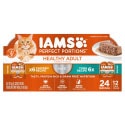
|
Iams Perfect Portions Healthy Adult Variety Pack |
|
CHECK PRICE |
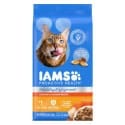
|
Iams Proactive Health Healthy Enjoyment Dry Food |
|
CHECK PRICE | |
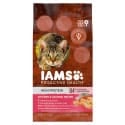
|
Iams ProActive Health High Protein Dry Food |
|
CHECK PRICE | |
Iams Cat Food Reviewed
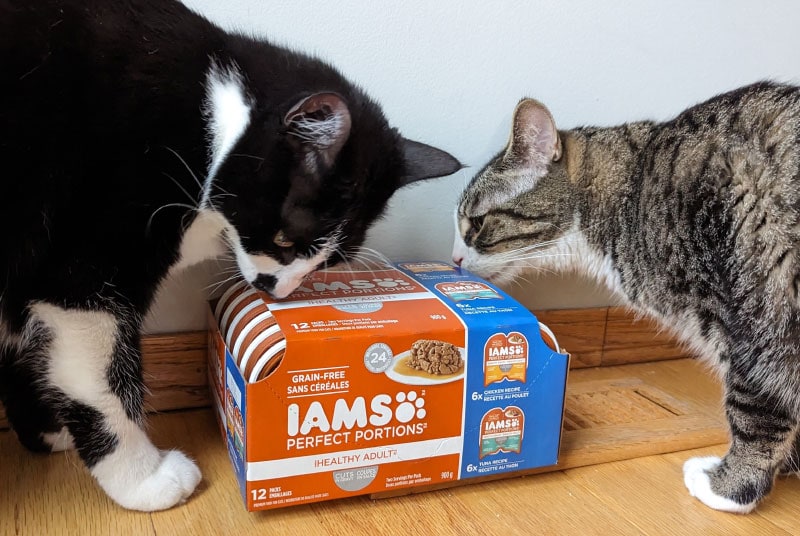
Who Makes Iams Cat Food and Where Is It Produced?
Iams is an American brand that produces food for dogs and cats. Mars, Incorporated, a multinational manufacturer of confectionery, pet food, and other food-related products, manufactures it.
The company was founded in the 1940s by its namesake, Paul Falknor Iams, an animal nutritionist. Iams was a college graduate and trendsetter who created the world’s first animal-based dry dog food in 1950. The company didn’t begin selling cat food until the 1980s.
Iams eventually sold his company to his business partner, who sold it to Procter & Gamble Company for over $2 billion in the late 90s. When ownership changed, Iams underwent numerous changes to lower its prices to be accessible to more pet owners. In 2014, the company changed hands again when P&G handed it to whom it belongs to today, Marc. Inc.
Iams is primarily manufactured in their Ohio, Nebraska, and North Carolina facilities.
Which Type of Cat Is Iams Best Suited For?
Iams has a huge product line-up that suits a wide range of cats. They manufacture dry and wet formulas and have recipes to address specific health concerns, such as immune health and healthy digestion. The company also manufactures life-stage recipes for your cats when they’re kittens and when they reach their golden years.
Iams is one of the most budget-friendly pet foods on the market. Cat owners who need to watch their wallets will be happy with the price point of Iams’ recipes.
Discussion of the Primary Ingredients
Cat owners want to make an informed decision about the food they’re feeding their cats. There is much misinformation about ingredients and their suitability for our pets, so let’s look at some of the great and not-so-good ingredients you’ll find in Iams cat food.

Chicken
Chicken is a lean protein source that gives your cat energy and promotes lean muscle mass. It also contains natural vitamins like B6 for sodium and potassium balance and fat and protein absorption. It has minerals such as selenium for a stronger immune response.
Salmon
Salmon is a fantastic source of protein and omega-3 fatty acids, which have anti-inflammatory properties and can promote coat and joint health. It also contains nutrients like riboflavin, which helps to release energy from fats, proteins, and carbohydrates.
Tuna
Cats love tuna, but it doesn’t have all the essential vitamins and minerals your cat needs to thrive. This may be why you often see tuna recipes that contain other protein sources like chicken.
Chicken Meal
Chicken meal is a powdery substance made of chicken parts and by-products. It’s most often made of the skin and bone of the chicken, though it can also include other parts like the neck, feet, and intestines.

Corn
Corn is a controversial ingredient in the cat food industry. The thought is that because it’s not food cats evolved to eat, they cannot digest it. This is not true, and corn provides energy and essential nutrients your cat needs.
Corn can be highly digestible, depending on how it is processed. Iams cat food contains different types of corn (whole grain corn, corn grits, corn gluten meal), and not all types may be as digestible as others.
Guar Gum
Guar gum is a filler often used in Iams wet cat food as a binding or thickening agent. Some studies suggest that guar gum can affect protein digestibility.
Tapioca Starch
Tapioca starch is a binding agent that allows Iams’ dry food recipes to form easily into kibble. It is a dense energy source and acts as a fiber, which may promote digestion.
However, it doesn’t provide much else beyond this. It is high in carbohydrates and may be high in sugar, neither of which is appropriate in high quantities in a cat’s diet.
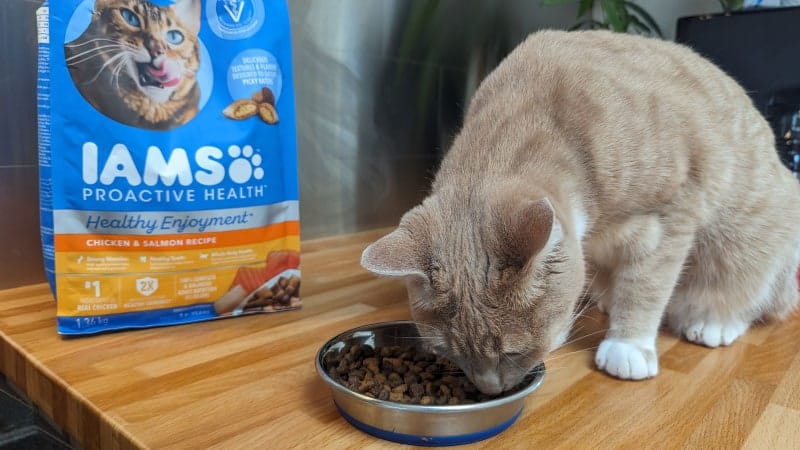
Addressing Health Concerns
Iams has several food formulas designed specifically to target health concerns. Their Advanced Health line is designed to support your cat’s whole-body health. Their Immune Health formula contains vitamin E for immune system health, while the Healthy Digestion recipe features live probiotics to promote healthy digestion.
Their Healthy Enjoyment line is designed with picky eaters in mind, as it provides a combination of savory soft and crunchy bites and kibble. The mixture of textures is what finicky cats need to keep them interested in their mealtimes.
Iams has a Hairball Care recipe with a proprietary fiber blend to reduce hairballs before they form and aid digestion. In addition to these forms that address certain health concerns, Iams offers foods designed specifically for seniors and kittens.
Their Healthy Senior Food is rich in protein to support your aging cat’s muscles and to provide plenty of energy to ensure he can still play in his senior years. Their Healthy Kitten formula contains nutrients found in a mother cat’s milk to promote the development of healthy bones and brains.
Affordability for All Pet Owners
Most Iams naysayers will look at the ingredient list and pick ingredients like “meat by-products” to prove that the food is “bad” for cats. Truthfully, by-products are not inherently bad.
There are strict legal definitions of what can be included under the term “by-products,” and despite what many misinformed (but well-meaning) bloggers say, this doesn’t include floor sweepings, hooves, or manure.
By-products are mainly organ meats and entrails and often provide your cat with more nutrients than just muscle meats on a per-weight basis.
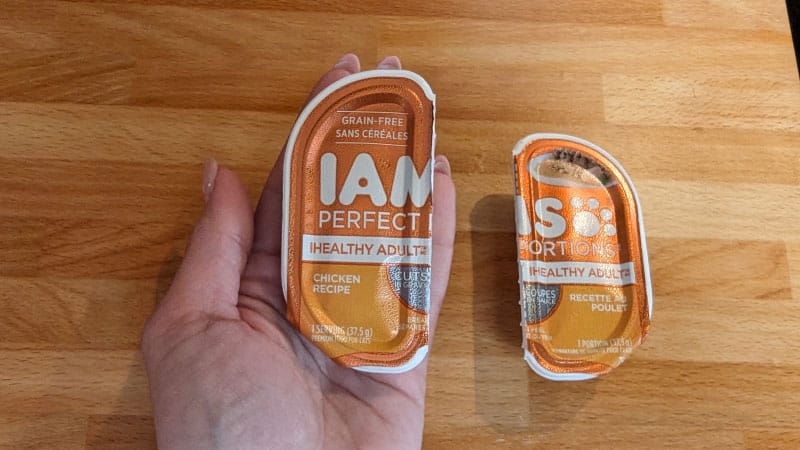
Ingredient Transparency & Sustainability
Iams isn’t very transparent about the source of the ingredients used in their recipes. However, all the subsidiaries associated with Mars are part of the company’s Responsible Sourcing program. In this program, they engage their first-tier suppliers worldwide to improve their sustainability performance.
Additionally, their Sustainable in a Generation Plan addresses concerns such as packaging, land use, and renewable resources, showing that the company cares about long-term sustainability. They even launched a 100% insect-based cat food in the United Kingdom to harness the power of a sustainable protein source (as unconventional as it may be).
Feeding your cat a high-quality diet is important for keeping them healthy and happy. But it goes beyond the food you choose; the dishes they use also matter. The Hepper NomNom Cat Bowl is our favorite for its unique, five-star design that protects from whisker fatigue and promotes good posture which also aids in better digestion. As an added bonus, it’s beautifully crafted and offers a modern take on the traditional cat bowl that fits seamlessly with all home stylings. Learn more about the NomNom by clicking here. At Catster, we’ve admired Hepper for many years and decided to take a controlling ownership interest so that we could benefit from the outstanding designs of this cool cat company!
Recall History
We feel it is crucial to mention Iams’ recall history so consumers can make an informed decision when choosing what to feed their pets. While the company hasn’t had a recall in over 10 years, its extensive recall history may concern some pet owners.
Iams has been recalled several times, but the last recall was in 2013. This recall affected many Iams dry dog and cat foods due to potential Salmonella contamination. Earlier that year, Iams recalled a smaller lot of dog treats due to the potential for mold.
In 2011, Iams recalled a single production lot of dry dog food due to high aflatoxin levels. Aflatoxins are toxins from fungi found in agricultural crops like corn, peanuts, and tree nuts.
Several recalls in 2010 affected the brand’s dog and cat food. Iams recalled lots of canned cat food as a precautionary measure as they may have contained insufficient levels of vitamin B1, a vitamin necessary for carbohydrate metabolism. They also recalled dry cat food twice that year due to the potential for Salmonella contamination.
The first Iams recall on record was in March 2007, when a widespread recall of many dog and cat foods occurred due to melamine contamination. By the end of the month, there were more than 100 reported pet deaths and 500 cases of kidney failure due to this contamination. It’s important to note that Iams wasn’t the only brand affected during this recall, which included Royal Canin, Hill’s Pet, Blue Buffalo, and Kirkland Signature.
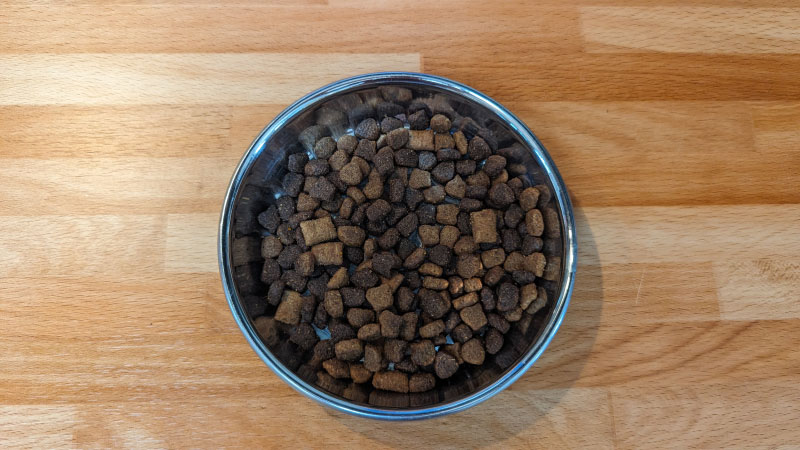
A Quick Look at Iams Cat Food
- Affordable price for all cat owners
- Real protein is the first ingredient
- Contains vitamins and minerals cats need to thrive
- High in protein
- Formulas available to address health concerns
- Formulas to address specific life stages
- No ingredient transparency
- Extensive recall history
Reviews of the Iams Cat Food We Tried
1. Iams Perfect Portions Healthy Adult Cuts In Gravy Variety Pack Wet Cat Food – Chicken & Tuna
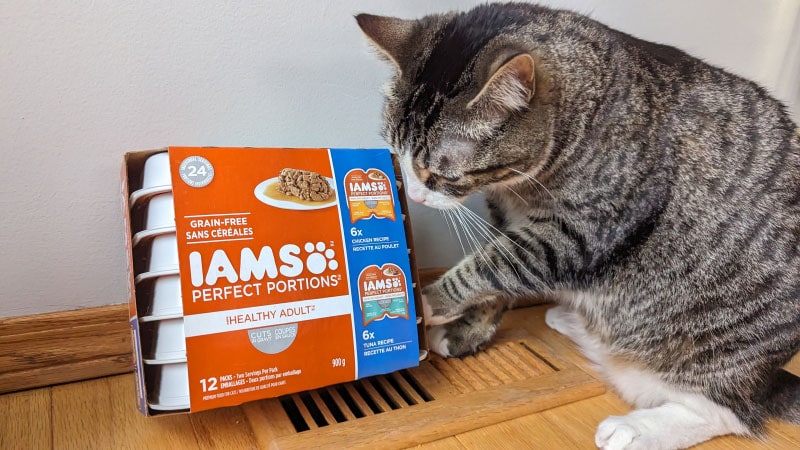
The Iams Perfect Portions trays are the company’s wet food option. These convenient, pre-portioned trays are simple to serve and take the guesswork out of feeding time. The chicken cuts recipe features chicken as the first ingredient, and since cats are obligate carnivores, you should always look for protein as the first ingredient. The recipe lists chicken broth as its first ingredient, followed by chicken in second place.
The recipes contain no fillers or artificial preservatives and are fortified with vitamins like vitamin E, an essential antioxidant your cat needs to protect his cells from oxidative damage. The strong scent and texture appeal to most cats, though some don’t like the cuts in gravy texture.
- Chicken is the first ingredient in the chicken recipe
- Easy to serve
- Pre-portioned
- Strongly scented to boost appetite
- No artificial preservatives
- Tuna recipe does not list protein as the first ingredient
- Some cats don’t like the texture
2. Iams Proactive Health Healthy Enjoyment Immune Support Chicken & Salmon Adult Dry Cat Food
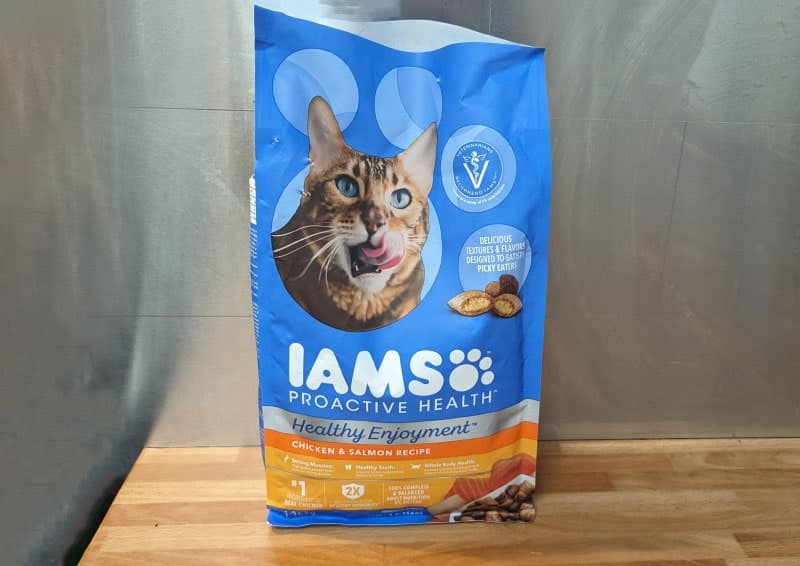
The Iams Proactive Health Healthy Enjoyment line-up is designed with picky eaters in mind. This kibble aims to provide a food that combines savory, soft, and crunchy bites with traditional kibble. This formula features real chicken as its main ingredient, followed by a chicken by-product meal.
The next three ingredients are different types of corn. This recipe is fortified with natural fibers and prebiotics to promote healthy digestion. It contains twice the antioxidants as compared to Iams’ other dry food recipes to boost healthy immunity. The formula is fortified with vitamin A, essential for vision, bone, and tooth growth, and contains no artificial preservatives.
- Different textures to keep cats interested
- The first ingredient is real chicken
- Promotes healthy digestion
- Fortified with vitamins and minerals
- No artificial preservatives
- Three of the first five ingredients are corn-related
3. Iams ProActive Health High Protein Chicken & Salmon Recipe Dry Cat Food
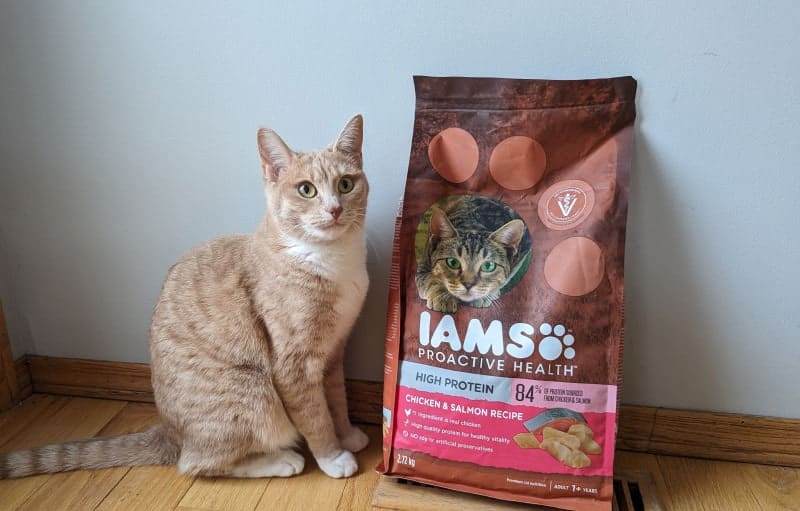
Cats require a high-protein diet to thrive. The Iams Proactive Health High Protein kibble is a great option to meet your cat’s protein requirement while helping him maintain muscle and nourish his heart health. Eighty-four percent of the protein in this formula is derived from chicken and salmon, providing your kitty with the high-quality protein he needs to thrive.
The first two ingredients of this recipe are chicken and chicken by-product meal. The next two ingredients are corn-derived, followed by salmon for a good source of omegas-3s. It contains a unique blend of prebiotics and beet pulp to promote digestive health and is made without artificial preservatives.
The kibble has a strong smell, which may be off-putting to some owners and their pets.
- High protein recipe to support muscle mass
- 84% of the protein is derived from animal sources
- Promotes digestive health
- No artificial preservatives
- Source of omega-3s
- Smell is a little strong
Our Experience With Iams Cat Food
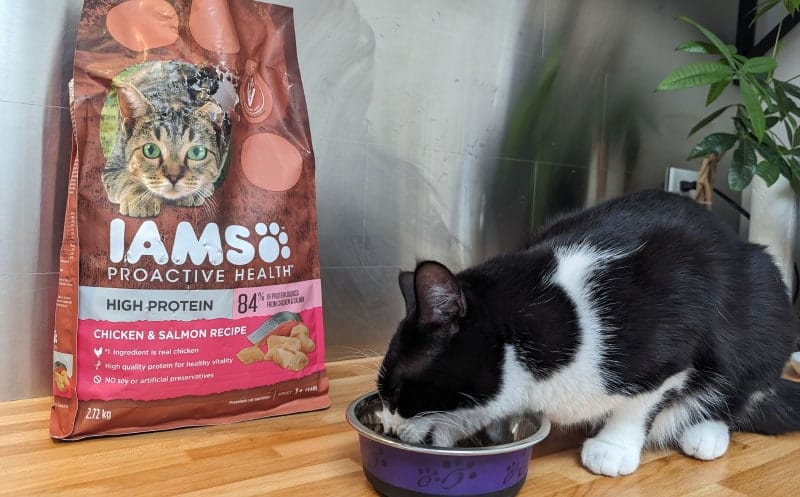
I have five indoor cats, ranging between one and 12 years of age. You can imagine how difficult it is to feed a houseful of cats, especially because they don’t all agree on what food they prefer. I was excited to give this Iams line-up a try because we’ve tried several brands and food types over the last few months and still couldn’t find any food our cats would eat consistently. They’d like one particular brand for a few feedings, but then would turn their noses up at it for their next meal.
As with most cats, mine adore wet food over dry, so we first tried out the Iams Perfect Portions Healthy Adult Cuts In Gravy trays. I honestly wasn’t expecting much of a response as my cats prefer the pate-style wet food, but I was shocked when all five immediately expressed interest in the cuts in gravy formula. They each gobbled down their serving. Even my pickiest cat, Belle, who typically needs her pate wet food watered down to eat it, didn’t just lap at the gravy. She ate her entire portion. This is a definite win for my household!
Before I get into the dry food reviews, I need to preface this with the fact that my cats absolutely tore into these bags. I kept the two bags of dry food in the cardboard box they arrived in for several days after their arrival. They could somehow smell the kibble through the bag and the box, opening the box and helping themselves to a taste. The bags were destroyed, which I think says something about the palatability of the recipes.
Moving on, we gave the Iams Proactive Health Healthy Enjoyment Immune Support recipe a try first. Upon opening the box, I could tell right away that this would be a hit with my cats. I don’t know if they’re so picky because they get bored of the usual foods we offer them, but after seeing the different kibble sizes and textures in this bag of food, I knew they’d love this stuff. I was right!
I was a little concerned that they might selectively eat the pieces of the formula they preferred over others, but that didn’t occur. Most of my cats enjoyed this recipe, even the dry food deniers of the household. Last but not least, we gave the Iams ProActive Health High Protein recipe a shot. The smell and look of this recipe underwhelmed me.
Especially when comparing it to the Healthy Enjoyment formula, the High Protein recipe left a little to be desired. The kibble is all very uniform in size and kind of bland-looking. My cats must have thought the same, as they mostly taste-tested this recipe and didn’t gobble it down like the previous two.
I haven’t noticed any adverse side effects from offering my cats these new recipes. Belle has a somewhat sensitive stomach and has taken to the Iams food beautifully, with no issues arising from the switchover.

Conclusion
Iams is a trusted pet food company with a long history. Their cat food is affordable, making it one of the best high-quality, budget-friendly brands available today. Their formulas are chock full of protein and are fortified with the vitamins, minerals, and nutrients your cats need to address their current life stage or health issues they may be facing.
We’d like to see more ingredient transparency so we know exactly where the food comes from, but we appreciate the brand’s commitment to sustainability.
All-in-all, we were pleased with how our cats enjoyed Iams. If they continue their no-recall streak and commit to more ingredient transparency, they will see a 5-star rating from plenty of cat owners!
- You Might Also Be Interested In: Cat Food Reviews
Contents
- At a Glance: What We Reviewed
- Iams Cat Food Reviewed
- Discussion of the Primary Ingredients
- Addressing Health Concerns
- Affordability for All Pet Owners
- Ingredient Transparency & Sustainability
- Recall History
- A Quick Look at Iams Cat Food
- Reviews of the Iams Cat Food We Tried
- 1. Iams Perfect Portions Healthy Adult Cuts In Gravy Variety Pack Wet Cat Food – Chicken & Tuna
- 2. Iams Proactive Health Healthy Enjoyment Immune Support Chicken & Salmon Adult Dry Cat Food
- 3. Iams ProActive Health High Protein Chicken & Salmon Recipe Dry Cat Food
- Our Experience With Iams Cat Food
- Conclusion

















